Edie Melson's Blog, page 62
February 4, 2024
Tips for Writers to Keep the Relationship with Social Media Strong & Healthy
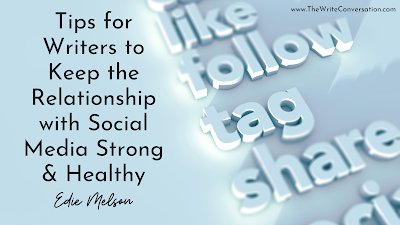
by Edie Melson @EdieMelson
We all know it’s important for writers to have a solid presence online.
But many of us struggle with Social Media commitment issues. We have good intentions, but our follow-through may be less than stellar.
So today I’d like to share 9 tips to help you stay on track.
9 Things that Help Writers Stay Committed to Social Media
1. Remember your why. When the reason we're on social media is strong enough, it can act like an anchor or a rudder. A strong why keeps us on track and helps us weather the storms. And that why can give us hope and perspective when we get discourage.
Many of you ask why I'm still on social media. For me it's simple. I feel like I'm called to be a light in the dark. I want to be a voice of love and encouragement. So when social media becomes a very dark place, it strengthens my resolve to stay because I know why I'm there and how I can make a difference.
2. Set reasonable expectations. I think this is the most important piece of advice I can give you. When I first started blogging, I wanted to excel at it. So my inclination was to set the bar high, posting at least five times a week. But the more I thought about it, the more I realized I might not be able to keep up. So instead I started slow, posting once a week, and only adding more days to my schedule when I knew I could handle it. It has been the smartest thing I’ve ever done. I’ve managed all my social media this way, and I believe it’s the one thing that has contributed the most to my success.
3. Don’t try to do it all at once. Along with reasonable expectations, don’t try to jump into everything at once. I began with blogging, moved into Facebook, and then into Twitter. Taking things one at a time helps you establish good habits without overburdening yourself.
4. Don’t try to do it all. It’s important to find a few things that you like with social media and stick with those. As I’m writing this, there are approximately 123 social media platforms. Five minutes from now that number will change. We can’t all do everything. Find the networks that work for you and concentrate on those instead of chasing every new things that comes up.
5. Diversify. Yes, stick with only a few platforms for your every day interactions, but make sure you are spreading your social media time between several networks. We all know that things change, and that’s true with social media. If you have all your social media eggs in one basket, you can get burned when those changes occur.
6. Give yourself a break. Trust me, life happens. There are going to be days when you won’t be able to give the time you want to social media. Relax, it will be fine. Kids get sick, deadlines appear, and tragedies strike. Keep your priorities reasonable and learn to be gentle with yourself.
7. Set a time limit. Remember social media is the means to an end. It’s the way to connect to your audience. Use it as a tool, but don’t spend all your time on it. Most of all, don’t let it interfere with your commitment to writing.
8. Celebrate your successes. It’s easy to get discouraged when the numbers move slowly. But small consistent steps will get you where you want to go. So celebrate the process.
9. Remember they’re people, not numbers. And those successes? The best ones come to us individually. The things that mean the most to me are when my words encourage someone else. That happens one personal at a time. Yes, we want to improve our platform, but don’t focus on the numbers, focus on the relationships. After all, that’s why we’re doing this.
These are the things I use to help overcome my social media commitment issues. I’d love to hear your tips, too. Be sure to leave them in the comments section below.
Don’t forget to join the conversation!Blessings,Edie
TWEETABLETips for Writers to Keep the Relationship with Social Media Strong & Healthy from @EdieMelson (Click to Tweet)
 Edie Melson is a woman of faith with ink-stained fingers observing life through the lens of her camera. No matter whether she’s talking to writers, entrepreneurs, or readers, her first advice is always “Find your voice, live your story.” As an author, blogger, and speaker she’s encouraged and challenged audiences across the country and around the world. Her numerous books reflect her passion to help others develop the strength of their God-given gifts and apply them to their lives. Connect with her on her website, through Facebook, Twitter and Instagram.
Edie Melson is a woman of faith with ink-stained fingers observing life through the lens of her camera. No matter whether she’s talking to writers, entrepreneurs, or readers, her first advice is always “Find your voice, live your story.” As an author, blogger, and speaker she’s encouraged and challenged audiences across the country and around the world. Her numerous books reflect her passion to help others develop the strength of their God-given gifts and apply them to their lives. Connect with her on her website, through Facebook, Twitter and Instagram.
Published on February 04, 2024 22:00
February 3, 2024
Show; Don’t Tell
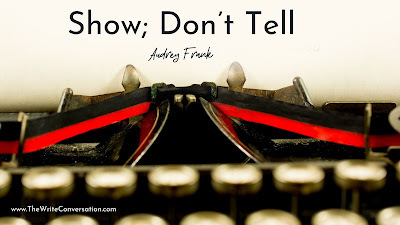
by Audrey Frank @AudreyCFrank
And he said to them, “Do you not yet understand?” (Mark 8:17-21)
The Master storyteller knew the secret of story-showing.
The disciples were Jesus’ critique group and beta readers. One day they would be His launch team. From dusty roads to stormy seas, they lived His stories with Him. They witnessed Jesus turn a few loaves of bread into enough to feed thousands, not once, but twice. Now, they are hungry and tired. In the hullabaloo of the last few days of feeding others, the disciples have forgotten to bring bread for themselves. They have just one loaf, and they begin to whine.
Unbeknownst to them, they are turning the page to another chapter, an important one. They have much to learn. Whining is a form of telling. When we’ve run out of energy, inspiration, and strength, we get sloppy.
By now, the disciples should know better. Jesus has shown them that with Him, they lack no good thing. But they are exhausted and don’t remember what they’ve seen.
They have forgotten they are walking with the One who is the Bread of Life. They have forgotten that He always takes their little and makes it more than enough.
He consistently showed them this truth, yet they still did not understand.
Jesus is listening to their telling. Their whining.
Why are you discussing the fact that you have no bread? Do you not yet perceive or understand? …Having eyes do you not see, and having ears do you not hear? And do you not remember? Mark 8:17-18
The disciples would become writers themselves. They were learning from Jesus how to show instead of tell. But today they still don’t understand. They will soon, at great cost.
For God so loved the world that he gave his one and only Son, that whoever believes in him shall not perish but have eternal life (John 3:16).
The Master storyshower came Himself to demonstrate the plot, conflict, and resolution of the Greatest Story. The Author and Finisher embodied the story He wrote. The disciples would witness every element of God’s story. Then they would understand.
One day they would write the story down for others. People like you and me, modern day disciples. Apprentices to the great story-shower.
Let us strive to understand.
He has shown us that we lack no good thing when we walk with Him. Let’s take up our pen today and write. He will surely multiply the little we bring and make it enough to feed thousands.
Lord, help me remember and understand. Then multiply my little to feed the hearts of thousands. Amen.
TWEETABLEShow, Don't Tell from author @AudreyCFrank on @EdieMelson (Click to Tweet)
 Audrey Frank is an author, speaker, and storyteller. The stories she shares are brave and true. They give voice to those whose words are silenced by shame, the hard things in life that don’t make sense, and the losses that leave us wondering if we will survive. Audrey and her family have spent over twenty years living and working among different cultures and world views, and she has found that God’s story of redemption spans every geography and culture. He is the God of Instead, giving honor instead of shame, gladness instead of mourning, hope instead of despair. Although she has three different degrees in communication and intercultural studies, Audrey’s greatest credential is that she is known and loved by the One who made her.
Audrey Frank is an author, speaker, and storyteller. The stories she shares are brave and true. They give voice to those whose words are silenced by shame, the hard things in life that don’t make sense, and the losses that leave us wondering if we will survive. Audrey and her family have spent over twenty years living and working among different cultures and world views, and she has found that God’s story of redemption spans every geography and culture. He is the God of Instead, giving honor instead of shame, gladness instead of mourning, hope instead of despair. Although she has three different degrees in communication and intercultural studies, Audrey’s greatest credential is that she is known and loved by the One who made her.Audrey is the author of Covered Glory: The Face of Honor and Shame in the Muslim World (Harvest House Publishers), an outpouring of Audrey’s heart to introduce others to the God of Instead. Shame is not unique to the developing world, the plight of the women behind veils, young girls trafficked across borders; shame is lurking in hearts everywhere. Through powerful stories from women around the world, Covered Glory illuminates the power of the Gospel to remove shame, giving honor instead. Available at favorite booksellers: BARNES & NOBLE, BOOKS A MILLION, AMAZON.
Published on February 03, 2024 22:00
February 2, 2024
Five Characters in a Writer’s Life

by Tim Suddeth @TimSuddeth
For the last few months, we’ve looked at how a writer is like a superhero. We’ve looked at how they are similar and at some of the super tools writers have at their disposal. Now, I want to look at some characters we all have in our lives. Many people have the stereotype that writers are hermits, loners who'd rather spend their day shut up in a room alone, with a coffee pot, headphones, and a blank page. Admittedly, a writer has to spend a lot of time staring at a screen, but if you ask anyone who has been writing for a long time, there are always other people involved.
Characters in a Writer’s Life
1. Mentors
As I’ve written here before, one of the best things that happened for my writing was joining a writers’ group. I’d left my job to stay with my son and felt the urge to write. But I didn’t know what that meant, if it was even possible, or where to start. Our paper had an ad for a group that met nearby. The group was Cross n Pens, that later became a chapter of Word Weavers International. And the ladies and man (singular) opened my eyes to a whole new world of writing possibilities.
One thing they did was they read my work. Making yourself vulnerable by letting others read what you’ve worked on is scary. So, you need to find someone you trust. They also gave me feedback with love. They knew I was a newbie, so they looked beyond the errors and helped dig out the good.
2. Peers
I have to admit that sometimes a mentor can be intimidating. Some of my mentors were a couple of steps or a mile ahead of where I was. I saw the work they put into writing, and I questioned whether I have that same desire. Let’s face it, useful goals take work. Finding someone who is going through the same troubles, discouragements, or achievements is helpful. Sometimes we need someone to talk to for encouragement and guidance, or to learn about submitting articles or devotions.
There is one big blaring warning with having a peer. You are not in a competition. You need to be supportive when they do well, even if you aren’t. When they win, you win.
3. Naysayers
Don’t they just warm your heart? People who ask whether this writing thing is worth it or if you have the chops. Sometimes they ask out of love because they don’t enjoy seeing you struggle. Here, be careful how often you run crying to them after losing another contest or having another rejection. They don’t understand that these are steps all writers go through, they just see your pain. Instead, call a peer and throw a pity party. Then get back to work.
We also have naysayers who we don’t know. A critique that doesn’t come with love or rejections from editors and agents. To tell you not to let it bother you would be crazy. It hurts. But understand that even our writing heroes still get them and often tack them to their wall as a badge of honor.
4. Distractors
We all have them. People who call just to talk because you’re only writing. (They don’t realize how precious your writing time is.) The family member who complains about you taking the time to write. Or your little baby coming to the kitchen table while you’re working and, looking at you with her big eyes, “Mommy, can’t you play with me?” (ouch)
Bend down and love on that child. As someone old enough to be on the other side, we have them for an oh-so-brief of time. They drive us up a wall and we sometimes want to throw them into the back forty, but they are a gift from God who we love. Everyone struggles to find a balance of writing and family, but the struggle is worth it.
Sometimes love comes with smooches and snow angels, and sometimes with a locked door and time limits.
5. Mentees
We talked about our need for a mentor earlier, but we also need to be willing to reach back to help those behind us. It’s easy to get so caught up in our hopes and desires that we get tunnel vision and forget about others. But we do that at a cost. (Not that it always has to be about me, but . . .)
Working with a mentee helps solidify what we’ve learned as we share it with them. They also give us a new perspective. But the best gift mentees provide is the encouragement that comes from seeing them experience something for the first time. It’s easy to become jilted with writing, same old same old. But it's awesome to witness someone achieve your old milestones like getting a website, attending their first conference, or connecting with other writers.
For a writer who spends so much of their time locked in a room, it’s important to appreciate the people involved in their writing journey. When we think of superhero movies, it’s those casts of characters that give the story depth, that let us see the hero overcome obstacles, and help the hero grow.
TWEETABLEFive Characters in a Writer's Life from @TimSuddeth on @EdieMelson (Click to Tweet)
 Tim Suddeth is a stay-at-home dad and butler for his wonderful, adult son with autism. He has written numerous blogs posts, short stories, and three novels waiting for publication. He is a frequent attendee at writers conferences, including the Blue Ridge Mountain Christian Writers Conference and a member of Word Weavers and ACFW. He lives near Greenville, SC where he shares a house with a bossy Shorky and three too-curious Persians. You can find him on Facebook and Twitter, as well as at www.timingreenville.com and www.openingamystery.com.
Tim Suddeth is a stay-at-home dad and butler for his wonderful, adult son with autism. He has written numerous blogs posts, short stories, and three novels waiting for publication. He is a frequent attendee at writers conferences, including the Blue Ridge Mountain Christian Writers Conference and a member of Word Weavers and ACFW. He lives near Greenville, SC where he shares a house with a bossy Shorky and three too-curious Persians. You can find him on Facebook and Twitter, as well as at www.timingreenville.com and www.openingamystery.com.
Published on February 02, 2024 22:00
February 1, 2024
Genre Expectations: Writing Romantic Fantasy and Fantasy Romance
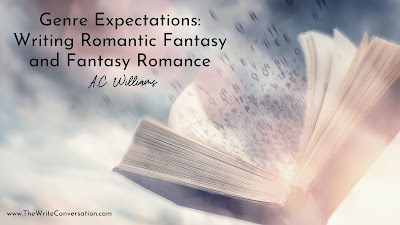
by A.C. Williams @ACW_Author
The best advice you can receive as an author in 2024 is to write a great story. Period. If you’ve put in the work to hone your craft, to identify your audience, and to understand your genre, and you’ve made the effort to get the words on a page, your writing will stand out.
But that brings up another topic: Genre.
I would swear that when I was young there were only three speculative genres in the world: Science Fiction, Fantasy, and Horror. Well, that is no longer the case in today’s world. With the increasing popularity and accessibility of self-publishing, authors can now create wild, imaginative subgenres of fiction to captivate and attract the niche stories that their specific audiences crave.
Being able to write to a niche audience and still be financially successful is a huge opportunity, but it requires a deep understanding of the genres you’re utilizing and the audience you’re speaking to.
If you write sci-fi comedy and I mention 42 and a bowl of petunias or tell you not to forget your towel, you’d better understand those references. If you don’t, you haven’t read the book that defines that genre (The Hitchhiker’s Guide to the Galaxy by Douglas Adams).
If you write space westerns and can’t understand how spaceships, faster-than-light travel, bar room brawls, and cattle drives can all take place in the same story, you may need to consider a different genre.
Declaring a genre is a promise you make to your readers. By placing yourself in a Category of Story, you are labeling your novel or series in such a way that your readers won’t be surprised or disappointed by what they find in it.
But there are SO MANY genres and subgenres now. How can you tell if you’re making a promise to your readers that you can’t keep?
For the next ten months, we’re going to be diving into some of the popular genres in the market right now. We need to understand what audiences who are looking for specific genres want. Sometimes that includes tropes that readers want to see in a story. Sometimes that involves certain types of story mechanics. So we’ll see if we can narrow them down and identify them.
And, since this is February, what better genre to start with than Romantic Fantasy? Or maybe I mean Fantasy Romance? Did you realize that they are different genres?
Yes, I’m serious.
Romantic Fantasy (sometimes called Romantasy now) is a fantasy novel with significant romantic subplots. So that means it may take place in a world that’s not our own. It may have elements of magic. It may have epic worldbuilding that includes different cultures and languages. And it will have a romantic storyline, of course, but that storyline isn’t the primary point of the story. The fantasy elements take center stage rather than the romantic storyline.
On the other hand, Fantasy Romance is a romance novel with fantasy elements. The romance, the relationship between the characters, is the primary point of the story, and the fantasy elements add some excitement and sparkle to it.
To be fair, there are no Genre Police (outside of internet trolls) who are going to come after you if you cross the very blurry line between these two related story category. But understanding the difference between them comes down to understand what your audiences want.
An audience that wants a romance novel that is telling the love story between two people may not be bothered if the fantasy elements aren’t top tier. What they want is a story focused on the relationship between the love interests.
An audience that wants a riveting, detailed, intricate fantasy novel with some romantic elements to add general swooniness is going to be upset if your worldbuilding isn’t spot on.
For me personally, I’m not a romance writer. I haven’t yet mastered the art of communicating intense, believable emotions on that level. I understand them well enough to write a romantic subplot, but I’m not sure I know how to make a romantic story the primary plot of a novel. I write fantasy books with romantic elements, so if I write that kind of a novel and promote it to romance readers, they’re going to be disappointed.
Beauty by Robin McKinley is a great example of a Fantasy Romance, a fantasy story that is primarily focused on the romance between two characters. It’s a retelling of Beauty and the Beast.
The Ravenwood Saga by Morgan Busse (Mark of the Raven, Flight of the Raven, Cry of the Raven) is a Romantic Fantasy. While the romantic story between the two main characters is essential to plot, the primary storyline isn’t the romance. It’s the main character learning what it means to be able to walk in other people’s dreams.
The romance genre and the fantasy genre go together beautifully, but one of them will take precedence in any hybrid. And the genre you use to categorize them will either invite your audience in or leave them disappointed.
TWEETABLEGenre Expectations: Writing Romantic Fantasy and Fantasy Romance from author @ACW_Author on @EdieMelson (Click to tweet)
 Award-winning author, A.C. Williams is a coffee-drinking, sushi-eating, story-telling nerd who loves cats, country living, and all things Japanese. She’d rather be barefoot, and if she isn’t, her socks won’t match. She has authored eight novels, two novellas, three devotional books, and more flash fiction than you can shake a stick at. A senior partner at the award-winning Uncommon Universes Press, she is passionate about stories and the authors who write them. Learn more about her book coaching and follow her adventures online at https://www.amycwilliams.com.
Award-winning author, A.C. Williams is a coffee-drinking, sushi-eating, story-telling nerd who loves cats, country living, and all things Japanese. She’d rather be barefoot, and if she isn’t, her socks won’t match. She has authored eight novels, two novellas, three devotional books, and more flash fiction than you can shake a stick at. A senior partner at the award-winning Uncommon Universes Press, she is passionate about stories and the authors who write them. Learn more about her book coaching and follow her adventures online at https://www.amycwilliams.com.
Published on February 01, 2024 22:00
January 31, 2024
Tips to Divide Up Your Writing Time Into Valuable Chunks
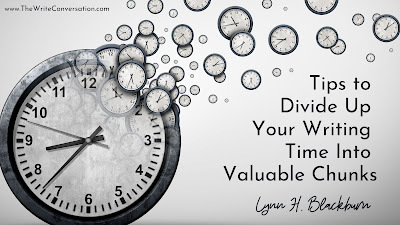
by Lynn H. Blackburn @LynnHBlackburn
Last month, I wrote a post, Meet Your Writing Goals This Year with These Valuable Tips where I mentioned the idea of the Manuscript Time Block (MTB) and this month, we’re going to do a deep dive into this concept!
First off, this is not an original idea of mine. My knowledge of MTBs comes from Becca Syme of Write Better-Faster.
This is how Becca defines an MTB:
MTBs are 30 minutes of time spent in your manuscript. So if you think, plan, plot, or write for 30 minutes, it counts as an MTB. That’s it!
I have to tell y’all—this idea has been a game changer for me. Here’s why:
I’m not a write every day writer. I’m not wired that way. And for a very long time, I worried that maybe I wasn’t a “real” writer because I not only didn’t, but truly couldn’t write every day.
I’ve learned a lot about myself, my wiring, and my process over the past decade or so, and I’m more confident in who I am and how I work.
Let’s pause for a moment to give the people who know me well time to laugh hysterically at the idea of me being confident in my process. Especially since as you read these words, I’m a month away from a deadline and therefore am in full panic mode. I’m sending daily, if not hourly, texts telling my writing confidantes that I’m a fraud and this is the worst book ever written.
Whew. Now that they’ve composed themselves, let’s continue.
It’s true that I’m not always confident! But I am okay with being someone who doesn’t write every day. My process involves more thinking time than writing time, which is why MTBs are so effective for me.
If you look back at Becca’s definition, you’ll see that THINKING is part of an MTB. In fact, it’s the FIRST THING ON THE LIST!
Hallelujah!
If you’ve been to lots of conferences, hung around with lots of writers, or read lots of writing blogs, you may be walking around with the misapprehension that the only thing that counts as writing is…writing.
NOT TRUE!
Agatha Christie famously said that the best time to plan a novel is while washing the dishes.
And how many times have you had an a-ha moment in the shower? Shower epiphanies happen so often that you can actually buy waterproof shower notes to capture your brilliance!
If you think about it (see what I did there?) you’ll remember that many of your best ideas and breakthroughs have happened when you’re somewhere other than your keyboard.
I think most writers experience this at some level. But for some of us, the thinking time that happens away from the keyboard isn’t just a delightful moment of serendipity that helps us reach our goal. It is absolutely critical to our process.
I need time to think and process a story, away from my keyboard, or the book will not happen. I can force myself to sit in front of the computer and pound out words, but if the thinking time hasn’t happened first, the session will be wildly ineffective at best and downright counterproductive at worst.
But I have to confess that far too often I’ve used this “I need time to think” part of my process as an excuse not to work consistently on my manuscript. The MTB takes that excuse away and provides me with an alternative way to track my work. ;)
The MTB gives me a way to hold myself accountable year round, not just when I’m on a deadline.
So far in 2024, it’s been fairly easy to measure progress with my word count. But later this month when the manuscript is complete, there’s an excellent chance that despite spending hours hard at work, my word count will go down.
If I use word count as my only metric, watching the word count go in reverse is demoralizing!
But if I use MTBs as my metric, this isn’t an issue. Every 30 minutes of work = 1 MTB. It doesn’t matter how many words I write or delete. It doesn’t matter if I get to the end of the day and the manuscript is even more of a hot mess than it was when I started. The MTB gives me a way to track my manuscript efforts, and even a tough day of writing will still generate multiple MTBs. As an over-achieving, list-making, task-completing kind of girl, this makes me very happy!
And it will be particularly crucial in March and April when my brain is fried from the effort of completing a story. I won’t even attempt to get new words written on my next manuscript until May at the earliest, but that doesn’t mean I can’t continue to be consistent with my writing. Given that I’m not using word count to determine success, March and April should include plenty of MTBs that are made up of research and daydreaming time.
The MTB has freed me from the tyranny of the word count goal. As I mentioned last month, my #24for24 writing goal is 24 MTBs a month. My hope is that focusing on the MTB rather than the word count will help me reach the word counts I need faster than ever before and with less stress.
I’ll have to let you know how that works out….next year!
In the meantime, what do you think of this concept? What would be important for you to include in the MTB list? I’d love to hear your thoughts!
Grace and peace,
TWEETABLENOTE: sometimes the click to tweet app shares an error claiming it's a spam site. That is an issue with Click to Tweet, NOT The Write Conversation. If that happens, you can share the link manually just fine. Tips to Divide Up Your Writing Time Into Valuable Chunks from @LynnHBlackburn on @EdieMelson (Click to Tweet)
 Lynn H. Blackburn is the award-winning author of Unknown Threat, Malicious Intent, and Under Fire, as well as the Dive Team Investigations series. She loves writing swoon-worthy southern suspense because her childhood fantasy was to become a spy, but her grown-up reality is that she's a huge chicken and would have been caught on her first mission. She prefers to live vicariously through her characters by putting them into terrifying situations while she's sitting at home in her pajamas! She lives in Simpsonville, South Carolina, with her true love, Brian, and their three children. Learn more at www.lynnhblackburn.com.
Lynn H. Blackburn is the award-winning author of Unknown Threat, Malicious Intent, and Under Fire, as well as the Dive Team Investigations series. She loves writing swoon-worthy southern suspense because her childhood fantasy was to become a spy, but her grown-up reality is that she's a huge chicken and would have been caught on her first mission. She prefers to live vicariously through her characters by putting them into terrifying situations while she's sitting at home in her pajamas! She lives in Simpsonville, South Carolina, with her true love, Brian, and their three children. Learn more at www.lynnhblackburn.com.
Published on January 31, 2024 22:00
January 30, 2024
Stages of Change and Creating Your Writing Success!
Edie here. Today I'm blown away to be able to introduce Margie Lawson as today's guest poster. I have been a fan of her writing instruction and inspiration for years and having her on The Write Conversation is a true bucket list moment for me! Not only that, but in Mary I'm going to have the opportunity to be on staff with with Margie and 5 other amazing industry professionals for “Polishing Your Mirror: Self-Care for Writers” Symposium, March 23-24. Be sure to give Margie a big TWC welcome!

Stages of Change and Creating Your Writing Success!by Margie Lawson @MargieLawson
You know what you want to accomplish with your writing. And you know what you need to do to get there. But you’re not doing moving forward. You’re not meeting your goals.
What’s stopping you? What’s getting in your way?
Maybe you’re stuck in a stage of motivation and change.
You need to know where you are regarding change so you can move forward and create your success. Prochaska developed a model depicting six stages of motivation and change.
Prochaska’s Stages of Motivation and Change:1. Pre-contemplation: Not sure about change.2. Contemplation: Seriously thinking about change.3. Preparation: Doing things to prepare for the change. 4. Action: Overtly engaged in change.5. Maintenance: Continuing to change.6. Termination: Reaching the goal.
It looks simple. Just move into the next stage, and the next, and the next.
It’s a no-brainer. Right?
How many times have all of us fooled ourselves by flirting with change for weeks to months, maybe years, before activating the new behavior? Before doing what we’ve told ourselves we wanted to do? Before reading that goal?
Sometimes we never do that thing. Never reach that goal. But it gnaws on our self-esteem and contaminates other areas of our lives.
These smart goals often seem too challenging.
Exercising? Eating right? Getting better sleep?
Writing? Meeting writing goals? Finishing your WIP?
Researching an agent? Submitting to an agent?
Learning how to self-pub? Self-publishing your book?
Have you ever looked back and wondered why the Holy Humperdincks it took you so long to finally do something? Something you wanted to do. Something you knew would be good for you.Something you knew would make you happy if you did it.
A writer told me she joined a writing organization, but didn’t get around to attending a meeting for years. Years. When she finally went, she got involved, developed close friends, and now couldn’t imagine her life without them and the writing group.
What locks us in the pre-contemplation, contemplation, and preparation stages for way What’s-wrong-with-me? too long?
Faulting thinking.
People tell themselves self-defeating things and believe them, shrinking their self-concept and their lives.
What about you?
What changes do you want to make?
Who can you recruit to be your Change Coach? Not someone who would be more of an Enabling Coach. Someone who will support, encourage, nudge, call you on your bullshit, and celebrate with you big-time when you succeed.
Let’s dig deeper into the stages of change.
1. Pre-contemplation: Not sure about change You’re probably beyond this stage with your main goal. But you may be in pre-contemplation for some others.
2. Contemplation: Seriously thinking about change.Are you here? Thinking? But not preparing for that change?What do you need to do to boost yourself into the next stage?What would that look like?
3. Preparation: Doing things to prepare for the change.What are you doing?What do you need to do to boost yourself into action?
4. Action: Overtly engaged in change.Yay! You made it! You’re excited. You’re proud. You’ve tapped into your steely self-discipline and you’re living your success.
5. Maintenance: Continuing to change.It’s tough. It takes emotional energy to keep going.You need to work with your Change Coach. Check in daily?You need to set up rewards too. Celebrate the little wins and the big wins!
6. Termination: Reaching the goal. You finished writing your book, or you got it published. You’re feeling fabulous! Celebrate that huge win and start writing your next book!
Using these stages of change is just one way to help you reach your goals.
Think positively. Make good decisions.
Get healthy and fit with things you can control with your body, mind, and emotions.
Think about what you want to do next. Where you want to go with your writing career.
Discover more of who you are. Your strengths. The areas you can improve.
Take charge of your life. Think bigger. About your books, your writing career, your joy.
Hopefully this piece about change has given you a cognitive kick into the change process.
Never settle for less.
The time is now. The change is you.
Learn more from Margie and six other amazing writers by attending the “Polishing Your Mirror: Self-Care for Writers” Symposium, March 23-24, 2024. Visit MindPotential.org for more info!
TWEETABLEStages of Change and Creating Your Writing Success! from @MargieLawson on @EdieMelson (Click to Tweet)
 Margie Lawson left a career in psychology to focus on another passion—helping writers make their writing bestseller strong. Using a psychologically based deep-editing approach, Margie teaches writers how to bring emotion to the page. A popular international presenter, Margie’s taught over 180 full day master classes in the U.S., Canada, Australia, New Zealand, and France. And she’s taught over 200 five-day intensive Immersion Master Classes in the U.S. and Australia.
Margie Lawson left a career in psychology to focus on another passion—helping writers make their writing bestseller strong. Using a psychologically based deep-editing approach, Margie teaches writers how to bring emotion to the page. A popular international presenter, Margie’s taught over 180 full day master classes in the U.S., Canada, Australia, New Zealand, and France. And she’s taught over 200 five-day intensive Immersion Master Classes in the U.S. and Australia.
She founded Lawson Writer's Academy where you’ll find over 30 instructors teaching online courses through her website. And you’ll find lots of webinars on her website too. She developed 35 webinars that share her deep editing techniques and more! Visit www.margielawson.com.

Stages of Change and Creating Your Writing Success!by Margie Lawson @MargieLawson
You know what you want to accomplish with your writing. And you know what you need to do to get there. But you’re not doing moving forward. You’re not meeting your goals.
What’s stopping you? What’s getting in your way?
Maybe you’re stuck in a stage of motivation and change.
You need to know where you are regarding change so you can move forward and create your success. Prochaska developed a model depicting six stages of motivation and change.
Prochaska’s Stages of Motivation and Change:1. Pre-contemplation: Not sure about change.2. Contemplation: Seriously thinking about change.3. Preparation: Doing things to prepare for the change. 4. Action: Overtly engaged in change.5. Maintenance: Continuing to change.6. Termination: Reaching the goal.
It looks simple. Just move into the next stage, and the next, and the next.
It’s a no-brainer. Right?
How many times have all of us fooled ourselves by flirting with change for weeks to months, maybe years, before activating the new behavior? Before doing what we’ve told ourselves we wanted to do? Before reading that goal?
Sometimes we never do that thing. Never reach that goal. But it gnaws on our self-esteem and contaminates other areas of our lives.
These smart goals often seem too challenging.
Exercising? Eating right? Getting better sleep?
Writing? Meeting writing goals? Finishing your WIP?
Researching an agent? Submitting to an agent?
Learning how to self-pub? Self-publishing your book?
Have you ever looked back and wondered why the Holy Humperdincks it took you so long to finally do something? Something you wanted to do. Something you knew would be good for you.Something you knew would make you happy if you did it.
A writer told me she joined a writing organization, but didn’t get around to attending a meeting for years. Years. When she finally went, she got involved, developed close friends, and now couldn’t imagine her life without them and the writing group.
What locks us in the pre-contemplation, contemplation, and preparation stages for way What’s-wrong-with-me? too long?
Faulting thinking.
People tell themselves self-defeating things and believe them, shrinking their self-concept and their lives.
What about you?
What changes do you want to make?
Who can you recruit to be your Change Coach? Not someone who would be more of an Enabling Coach. Someone who will support, encourage, nudge, call you on your bullshit, and celebrate with you big-time when you succeed.
Let’s dig deeper into the stages of change.
1. Pre-contemplation: Not sure about change You’re probably beyond this stage with your main goal. But you may be in pre-contemplation for some others.
2. Contemplation: Seriously thinking about change.Are you here? Thinking? But not preparing for that change?What do you need to do to boost yourself into the next stage?What would that look like?
3. Preparation: Doing things to prepare for the change.What are you doing?What do you need to do to boost yourself into action?
4. Action: Overtly engaged in change.Yay! You made it! You’re excited. You’re proud. You’ve tapped into your steely self-discipline and you’re living your success.
5. Maintenance: Continuing to change.It’s tough. It takes emotional energy to keep going.You need to work with your Change Coach. Check in daily?You need to set up rewards too. Celebrate the little wins and the big wins!
6. Termination: Reaching the goal. You finished writing your book, or you got it published. You’re feeling fabulous! Celebrate that huge win and start writing your next book!
Using these stages of change is just one way to help you reach your goals.
Think positively. Make good decisions.
Get healthy and fit with things you can control with your body, mind, and emotions.
Think about what you want to do next. Where you want to go with your writing career.
Discover more of who you are. Your strengths. The areas you can improve.
Take charge of your life. Think bigger. About your books, your writing career, your joy.
Hopefully this piece about change has given you a cognitive kick into the change process.
Never settle for less.
The time is now. The change is you.
Learn more from Margie and six other amazing writers by attending the “Polishing Your Mirror: Self-Care for Writers” Symposium, March 23-24, 2024. Visit MindPotential.org for more info!
TWEETABLEStages of Change and Creating Your Writing Success! from @MargieLawson on @EdieMelson (Click to Tweet)
 Margie Lawson left a career in psychology to focus on another passion—helping writers make their writing bestseller strong. Using a psychologically based deep-editing approach, Margie teaches writers how to bring emotion to the page. A popular international presenter, Margie’s taught over 180 full day master classes in the U.S., Canada, Australia, New Zealand, and France. And she’s taught over 200 five-day intensive Immersion Master Classes in the U.S. and Australia.
Margie Lawson left a career in psychology to focus on another passion—helping writers make their writing bestseller strong. Using a psychologically based deep-editing approach, Margie teaches writers how to bring emotion to the page. A popular international presenter, Margie’s taught over 180 full day master classes in the U.S., Canada, Australia, New Zealand, and France. And she’s taught over 200 five-day intensive Immersion Master Classes in the U.S. and Australia. She founded Lawson Writer's Academy where you’ll find over 30 instructors teaching online courses through her website. And you’ll find lots of webinars on her website too. She developed 35 webinars that share her deep editing techniques and more! Visit www.margielawson.com.
Published on January 30, 2024 22:00
January 29, 2024
Fear: The Brick Wall Every Writer Dreads
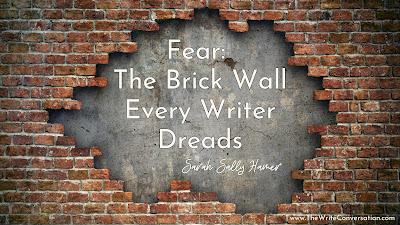
by Sarah Sally Hamer @SarahSallyHamer
Most humans have something they’re afraid of. Fear is an amazing driving force which is at the base of almost every action and every emotional reaction we have. But why does this primal instinct have such a hold on us?
Because fear keeps us safe.
Read that again. Fear keeps us safe. Back when humans weren’t on top of the food chain, the rustling of the bushes might have been a grizzly bear instead of a squirrel. The rustling sets off all sorts of signals in our brain and alerts us that something dangerous might be lurking. Without fear, we might be lunch.
But fear can absolutely be stultifying. In our modern world, we call it lots of names—procrastination, writer’s block, too busy. Do you have an excuse for not performing at your highest ability? Maybe it’s just plain fear of doing well.
There are as many fears as there are writers. A little soul-searching can help uncover that fear but, until we face it, it can make our life miserable.
One of my favorite Joseph Campbell quotes is: “The cave you fear to enter holds the treasure you seek.” In so many words, fear keeps us from danger but maybe what we fear isn’t really dangerous but just an old concept that recurs when we face something we aren’t sure of.
So, what is it that you fear? It could be the fear of losing something, like a loved one or money or even your life. It could be a fear of finding something, like information that will challenge your concepts about writing.It could be a fear of not being strong or brave or resourceful enough. All of these things are valid and there are thousands more.
How Do We Fix the Fears That Plague Writers
1. Search for whatever it is that you are really afraid of. Stand at the mouth of that cave where your treasure lies and take a step. Facing a monster, er... fear, is the first of many of those steps that will allow you to dig up the things that stop you from what you want.2. Set a goal. I know, that sounds so easy and can be so hard. But, just like with characters in a story, we need a goal to work towards. It can be tiny—just turn your computer on. Or huge, like writing 1667 words a day (for the NaNoWriMo crew). It truly doesn’t matter what your goal is but, may I suggest, you pick small ones first. Don’t overwhelm yourself by creating goals that are too big.3. Stop bruising your forehead by banging it against a brick wall. Remember, you don’t have to go straight through a problem. Sometimes going around, or under, or over a problem is much simpler. Get help if you need it—there are many, many, many experienced folks who can help, if you only ask.4. Quit creating things to be afraid of. This is one of the hardest for me. Our amazing creative minds—and writers are probably more creative than most—can imagine every one of the millions of things that can go wrong or that we “should” be afraid of. Stop it! Take a breath. Go for a walk. Call a friend. Give yourself a break!
Bottom line: Fear is both bad and good. It really doesn’t matter which. It still can be controlled. Otherwise, we’ll be running away every time there’s a rustling in those bushes.
What do you fear? What will you do to overcome it?
Learn more from Sally and six other amazing writers by attending the “Polishing Your Mirror: Self-Care for Writers” Symposium, March 23-24, 2024. Visit MindPotential.org for more info!
TWEETABLEFear: The Brick Wall Every Writer Dreads insight from @SarahSallyHamer on @EdieMelson (Click to Tweet)
 Sarah (Sally) Hamer, B.S., MLA, is a lover of books, a teacher of writers, and a believer in a good story. Most of all, she is eternally fascinated by people and how they 'tick'. She’s passionate about helping people tell their own stories, whether through fiction or through memoir. Writing in many genres—mystery, science fiction, fantasy, romance, medieval history, non-fiction—she has won awards at both local and national levels, including two Golden Heart finals.
Sarah (Sally) Hamer, B.S., MLA, is a lover of books, a teacher of writers, and a believer in a good story. Most of all, she is eternally fascinated by people and how they 'tick'. She’s passionate about helping people tell their own stories, whether through fiction or through memoir. Writing in many genres—mystery, science fiction, fantasy, romance, medieval history, non-fiction—she has won awards at both local and national levels, including two Golden Heart finals.A teacher of memoir, beginning and advanced creative fiction writing, and screenwriting at Louisiana State University in Shreveport for over twenty years, she also teaches online for Margie Lawson at www.margielawson.com. Sally is a free-lance editor and book coach at Touch Not the Cat Books, with many of her students and clients becoming successful, award-winning authors.
You can find her at info@mindpotential.org
Published on January 29, 2024 22:00
January 28, 2024
Tips to Help You to Get Back into a Rhythm of Writing Regularly
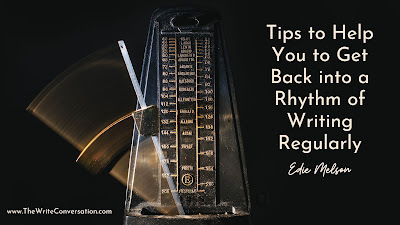
by Edie Melson @EdieMelson
Let’s admit it. Life happens. There are seasons when our regular practice of writing either gets pushed to the side or becomes just something we have to do. When either of these things happen, writing becomes a chore instead of a joy. That can lead us to either abandon the regular discipline of writing or push it to the end of the line.
So how do we get back into a joyful rhythm of writing regularly?
First, please notice my terminology—writing regularly. I do not believe a serious writer must write every day. Some do and that’s great because that works for their circumstances. But I also know very successful writers who write less frequently (but still regularly) because their lives dictate a different rhythm.
This post isn’t written to cause anyone guilt because we’re not doing it right. Instead I want us to recapture the joyful practice making writing a priority.
10 Ways to Jumpstart Your Writing After a Lull
1. Review your creative biorhythm. Re-evaluate which times, in a twenty-four-hour time frame, that you’re most creative. For me, my most creative time is in the morning. Because of that, I try not to schedule appointments or meetings during that time on the days I have set aside for writing.
2. Take an honest look at your calendar. If you’re like me, there are times when life overwhelms my writing schedule. My calendar begins to fill up and either forget or avoid setting aside regular time to write. Then, when I’m ready to jump back in, I see I’ve scheduled things during the times when I usually write.
3. Change the appointments you can. If you have writing times that now have other appointments, change what you can and don’t worry about the rest. I’m doing my best to adopt the life style of not worrying about those things I cannot change.
4. Once again commit to writing regularly. For me, that means noting writing times on my calendar. When I write it down, I’m much more likely to keep the appointment, and I’m more likely to remember it when life is crazy.
5. Keep the appointment. When we’ve been away from writing for a while (it could be a couple of days, a week, or longer) sometimes we find it hard to sit down and begin. The blank page is intimidating and it feels easier to put it off until tomorrow. DON’T. Do the hard thing and sit down at the computer and BEGIN TYPING WORDS.
6. Pray first. When you sit down to type, pray first. Ask God to give you what you need to restart your writing discipline.
7. Give yourself grace. Just like when we’re out of shape physically, being out of writing shape means we need time to come back up to speed. We probably won’t be as productive or as fast. Our minds won’t give us the words as easily. Be gentle with yourself and be your own best encourager.
8. Enlist encouragers. Let your writing buddies know you’re coming out of a hard patch and need some prayer and encouragement. Let your prayer team know so they can be praying specifically.
9. Celebrate the wins. Begin by acknowledging the fact that starting again is a WIN. Pat yourself on the back. Build in rewards when you keep the appointments with yourself.
10. Make it fun. There are times when writing is work. But there are also times when it’s fun. Be sure to build in some fun writing into your schedule. This could be trying something new or using a writing prompt. It could also mean writing in a different way—on paper with a cool pen instead of using the computer. You could also change where you write. If you normally write at home, take your writing to the park or the coffee shop. Whatever it takes, don’t leave out the joy!
This is my short list of things that help me get back into a writing groove. I’d love to know what you’d add to the list. Be sure to leave your thoughts in the comments section below.
Don’t forget to join the conversation!Blessings, Edie
TWEETABLETips to Help You to Get Back into a Rhythm of Writing Regularly from @EdieMelson (Click to Tweet)
 Edie Melson is a woman of faith with ink-stained fingers observing life through the lens of her camera. No matter whether she’s talking to writers, entrepreneurs, or readers, her first advice is always “Find your voice, live your story.” As an author, blogger, and speaker she’s encouraged and challenged audiences across the country and around the world. Her numerous books reflect her passion to help others develop the strength of their God-given gifts and apply them to their lives. Connect with her on her website, through Facebook, Twitter and Instagram.
Edie Melson is a woman of faith with ink-stained fingers observing life through the lens of her camera. No matter whether she’s talking to writers, entrepreneurs, or readers, her first advice is always “Find your voice, live your story.” As an author, blogger, and speaker she’s encouraged and challenged audiences across the country and around the world. Her numerous books reflect her passion to help others develop the strength of their God-given gifts and apply them to their lives. Connect with her on her website, through Facebook, Twitter and Instagram.
Published on January 28, 2024 22:00
January 27, 2024
Choosing the Right Story: Three Questions Every Writer Should Ask
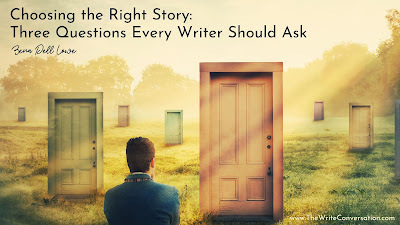
by Zena Dell Lowe @ZenaDellLowe
Choosing a story is a bit like sailing the high seas—some ideas sparkle like gold, but others are just fool's gold, shiny yet devoid of true value. In the literary realm, it's the difference between discovering treasure or venturing into the abyss of forgotten tales, like pirates who, despite their shiny pursuits, found only a world of death.
Here’s the perilous truth: not every story is created equal. But how can we make sure we choose the right tale? It takes a long time to successfully pen a long-form story. The pain of choosing the wrong path at the outset can be profound, leading writers into treacherous waters that sap enthusiasm, waste time, and often result in the abandonment of promising projects. To help you narrow down the possibilities, here are three crucial questions every writer should consider before they ever sit down to write.
1. Do You Have Passion for Your Story?
Writing is an inherently personal act, a transmutation of thoughts, emotions, and imagination into words on a page. When a writer is passionate about the story they are telling, their passion is contagious. Readers can sense when a writer is genuinely invested in their narrative. It transcends the pages, creating an immersive experience that resonates.
Passion also fuels the writer’s own creativity, which can transform a mundane story into a masterpiece. It’s heartbeat of creativity, and when it pulsates through your storytelling, it breathes life into characters, infuses vitality into plots, and prompts the creation of exciting scenes that are the backbone of the story.
Moreover, when your chosen story aligns with your passions and interests, the journey becomes an exhilarating adventure rather than a laborious trek. The enthusiasm you bring to the writing desk becomes a wellspring of inspiration, propelling you through the challenges of plot development, character arcs, and intricate world-building. Passion acts as a reservoir of resilience, helping you navigate the inevitable challenges and revisions with unwavering determination.
2. Do You Know Who Your Audience Is?
Writing, at its core, is a form of communication. A conversation between the author and the reader that transcends the boundaries of time and space. Yet, as any seasoned writer will attest, this dialogue can become lost in the vast expanse of literary creation without a clear understanding of the audience. Identifying your readership is akin to finding the North Star in your writing odyssey—a guiding light that not only shapes your narrative but ensures it resonates with those who embark on the journey with you.
One of the cardinal mistakes aspiring writers often make is neglecting the importance of defining their audience. Whether fueled by the sheer passion of storytelling or the desire for universal acclaim, the failure to pinpoint the intended readership can lead a writer to ruin. Your story, no matter how brilliantly conceived, becomes a ship without a compass if it lacks a defined destination—an audience. Moreover, understanding your readership provides invaluable insights into their expectations, preferences, and the emotional chords you must strike to keep them invested.
In a saturated literary landscape, where readers can choose from an abundance of options, the ability to resonate with a specific audience becomes a strategic advantage. Whether you're crafting a mystery novel, science fiction saga, or a heartwarming coming-of-age tale, your words carry more weight when they find a receptive audience eagerly awaiting the next chapter.
3. Do You Have a Compelling Main Character?
Choosing a story with a compelling main character is not just a narrative choice; it's imperative. The heart of every story is a main character whose journey captivates the audience. This protagonist must be the driving force of your story, the catalyst that sparks engagement and emotional investment. A compelling main character provides readers with a relatable and tangible entry point into the character’s journey. Readers must form an emotional bond with your character—this is what hooks them and keeps them emotionally engaged. Thus, you first need to make sure that you have a character who is likable, sympathetic, or intriguing. Then you need to make sure that he or she drives the action of your story.
A dynamic main character injects vitality into the storytelling process by making choices under pressure to pursue a primary objective over the course of the telling. Their choices are what allows the plot to unfold, which is why they must be active and not passive. This, in turn, allows the reader to engage more fully in the protagonist’s journey. Rather than being a passive observer, readers become active participants in the protagonist's triumphs and tribulations.
A well-defined goal or objective that the main character pursues is the key to creating a compelling main character that will captivate the heart of your readers. The pursuit of this goal becomes the whole point of the story, the driving force that propels the plot forward.
Consider classic examples like Frodo Baggins on his quest to Mount Doom or Sherlock Holmes unraveling intricate mysteries. In each case, it's the characters' unwavering pursuit of their objectives that transforms an ordinary story into an extraordinary one. Readers become invested not only in the outcome but in the character's transformative journey.
Choosing a story with a compelling main character is an investment in the soul of your narrative. It's a commitment to crafting a protagonist whose presence lingers in the minds of readers, inspiring empathy, introspection, and a lasting connection.
Conclusion
These aren’t the only factors you should consider when choosing which story to tell, but this will at least give you a good starting point for elimination, and hopefully lead you to the right path.
For more help on this topic, check out my brand-new course for novelists, Hollywood Story Structure Made Easy. Just go to https://www.thestorytellersmission.com/story-structure-made-easy to learn more!
TWEETABLEChoosing the Right Story: Three Questions Every Writer Should Ask from @ZenaDellLowe on @EdieMelson (Click to Tweet)
 Zena has worked professionally in the entertainment industry for over 20 years as a writer, producer, director, actress, and story consultant. Zena also teaches advanced classes on writing all over the country. As a writer, Zena has won numerous awards for her work. She also has several feature film projects in development through her independent production company, Mission Ranch Films. In addition to her work as a filmmaker, Zena launched The Storyteller’s Mission with Zena Dell Lowe, a podcast designed to serve the whole artist, not just focus on craft. In 2021, Zena launched The Storyteller’s Mission Online Platform, where she offers advanced classes and other key services to writers. Zena loves story and loves to support storytellers. Her passion is to equip artists of all levels to achieve excellence at their craft, so that they will truly have everything they need to change the world for the better through story.
Zena has worked professionally in the entertainment industry for over 20 years as a writer, producer, director, actress, and story consultant. Zena also teaches advanced classes on writing all over the country. As a writer, Zena has won numerous awards for her work. She also has several feature film projects in development through her independent production company, Mission Ranch Films. In addition to her work as a filmmaker, Zena launched The Storyteller’s Mission with Zena Dell Lowe, a podcast designed to serve the whole artist, not just focus on craft. In 2021, Zena launched The Storyteller’s Mission Online Platform, where she offers advanced classes and other key services to writers. Zena loves story and loves to support storytellers. Her passion is to equip artists of all levels to achieve excellence at their craft, so that they will truly have everything they need to change the world for the better through story.To find out more about Zena or her current courses and projects, check out her websites at WWW.MISSIONRANCHFILMS.COM and WWW.THESTORYTELLERSMISSION.COM
Published on January 27, 2024 22:00
January 26, 2024
Stop Procrastinating and Write Something Today!

by Edie Melson @EdieMelson
As writers, it's easy to find reasons not to write. So today I wanted to remind all of us—me included—that there are also a lot of reasons to sit down and put those words on a screen (or paper), offering some encouragement to writers. After all it's really just a matter of perspective!
And truthfully, some of those reasons we come up with not to write are the best reasons to write.
15 Reasons to Write Today
1. Because you’re in the middle of a crisis2. Because you’re not in the middle of a crisis3. Because you need to stay in your best writing shape 4. Because If you don’t you’ll feel worse5. Because you have a contract6. Because you don’t have a contract7. Because you’ve been told you’re a good writer8. Because you’ve been told you’re not a good writer9. Because you have a gift...and it’s rude not to put it to use10. Because you have an idea11. Because you don’t have an idea12. Because you’re young13. Because you’re old14. Because God called you to write 15. Because writers write, and you’re a writer, right?
So who's with me? Will you turn those reasons upside down and agree to begin looking at them as motivation to write? Share your thoughts—and your commitment—in the comments section below!
Don't forget to join the conversation!Blessings, Edie
TWEETABLEStop Procrastinating and Write Something Today! Encouragement from author @EdieMelson (Click to Tweet)
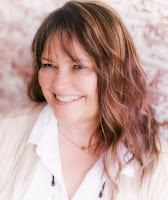 Edie Melson is a woman of faith with ink-stained fingers observing life through the lens of her camera. No matter whether she’s talking to writers, entrepreneurs, or readers, her first advice is always “Find your voice, live your story.” As an author, blogger, and speaker she’s encouraged and challenged audiences across the country and around the world. Her numerous books reflect her passion to help others develop the strength of their God-given gifts and apply them to their lives. Connect with her on her website, through Facebook, Twitter and Instagram.
Edie Melson is a woman of faith with ink-stained fingers observing life through the lens of her camera. No matter whether she’s talking to writers, entrepreneurs, or readers, her first advice is always “Find your voice, live your story.” As an author, blogger, and speaker she’s encouraged and challenged audiences across the country and around the world. Her numerous books reflect her passion to help others develop the strength of their God-given gifts and apply them to their lives. Connect with her on her website, through Facebook, Twitter and Instagram.
Published on January 26, 2024 22:00



